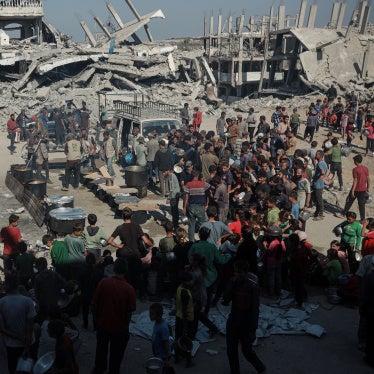This week’s news about last summer’s fighting in Gaza and Israel seems sadly familiar.
On Sunday, the Israeli military announced the only indictments so far of any soldiers for alleged wrongdoing during the offensive last July and August, during which Human Rights Watch and others reported apparent violations of the laws of war by Israeli forces that resulted in civilian deaths. Two soldiers were charged with looting about US$600 from a Palestinian home; the third, with covering it up.
Israel’s military says it is looking into more than 100 “exceptional incidents” during the Gaza fighting, but unless the military’s internal investigative system is reformed, its record suggests that the inquiries will not amount to much. During the previous Israeli ground incursion in Gaza in 2008-09, Israeli soldiers were implicated in many serious laws-of-war violations that may have amounted to war crimes. Yet only four soldiers were convicted of any wrongdoing – the longest jail sentence being 7½ months to a soldier who stole a Palestinian’s credit card.
An Israeli government-appointed committee, the Turkel commission, recommended sweeping changes to the military’s investigations in February 2013. The commission called on Israel, for instance, to apply criminal responsibility to not only soldiers but also commanders who ordered, knew or should have known about offenses carried out by their subordinates. Israel has taken some positive steps – such as a regulation published this week making it possible to appeal decisions by the military advocate general regarding alleged war crimes to the civilian attorney general – but the military hasn’t yet made a range of other crucial changes, such as resolving the military advocate general’s conflict of interest in investigating attacks that he may have legally authorized, fully criminalizing all war crimes under Israeli law, and ending unnecessary delays in opening criminal investigations.
Meanwhile, Hamas has launched no credible investigations into unlawful rocket and mortar attacks by Palestinian armed groups toward Israeli population centers or other alleged war crimes in the 2009 or 2014 fighting – such as the summary execution of alleged spies, who in reality were dragged out of prison and shot in the street by masked gunmen.
Without accountability to deter violations, there is mounting evidence that history is repeating itself. After the 2008-09 fighting in Gaza, United Nations Secretary-General Ban Ki-moon released the summary of a report on attacks that hit UN facilities. It found that Israeli forces carried out attacks that killed and wounded civilians and destroyed UN facilities, and that a Hamas rocket damaged a UN warehouse near the border. This week, Ban Ki-moon released the summary of a report on the 2014 fighting, which found that Israeli attacks killed between 44 and 47 civilians who were sheltering in UN schools in Gaza and wounded another 229 to 234. The report also criticized Palestinian armed groups for storing weapons in three empty schools and apparently launching rockets from two of them.
Palestinian and Israeli victims of war crimes have had virtually no chance of obtaining justice. But one key difference separates the hostilities in 2008-09 and 2014: Palestine’s recent decision to join the International Criminal Court, giving the court jurisdiction over alleged war crimes committed by all parties in the West Bank and Gaza. The ICC is a court of last resort when national authorities are unwilling or unable to prosecute. Should there be no change in direction by either the Israeli or Palestinian authorities, prospects for cases before the ICC may begin to loom large.








